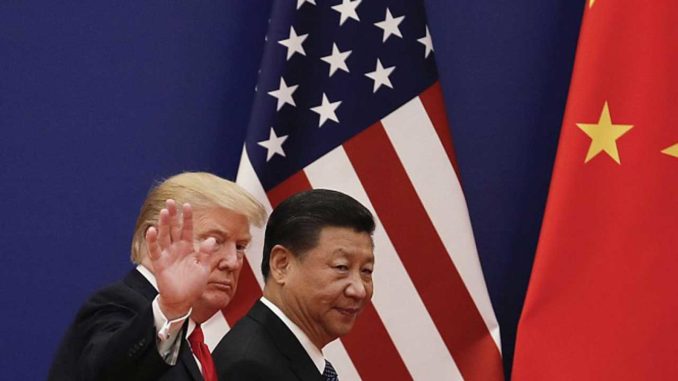
Nigeria may think that the trade war that began with the USA imposing tariffs on China and China retaliation by doing likewise, will have no impact on the country. That is largely correct as the shift in trade patterns, as Chinese firm’s direct goods to other countries, could have little direct impact. Nigeria has little attraction for a Chinese firm seeking to redirect steel export from the USA. Such a firm will seek to export the steel that became now-overpriced for U.S. consumption to Europe or Japan. While the extra supply will lower prices and negatively impact steel producers in those markets it will reduce prices for making products like cars and flat panel televisions, that users of steel products may pass on to consumers. In that manner, Nigerian consumers may see price reductions, subject to the value of the Naira, the vagaries of government policy and nature of domestic competition.
The major lesson Nigeria must draw from the evolving trade war, is however institutional and not merely price economics. The willingness of the Trump administration to impose higher tariffs on a wide range of imported goods, is directly related to the jobs and earnings loss they cause and not their impact on lowering prices, enhancing innovation, and fostering competition. That fact should make Nigeria pause because it is a clear demonstration that the highest responsibility of a government, is the protection of the welfare of its people. It demonstrates that the obvious impacts of a policy, is more significant than other impacts that may be as equally consequential but not as visible. Largely because tribe and tongue differ, Nigeria implements a policy of rotating high positions including that of the president. This is seen as the solution to the fact that the European powers at the Berlin Conference constructed a country that maintains one of the highest levels of ethnic diversity in the world. But beyond that, a country where the negative consequences of an attempt by any single ethnic group, to seek to dominate others, has been made plain to be gruesome war. However, Nigeria must examine the dividends of its rotation norm – like president Trump examined the impact of trade on his country – and reach actionable conclusions.
There is scant evidence that rotation has acted to deliver major positive dividends. Politically, there is still little evidence of ideology as a basis of party formation and party loyalty, as politicians continue to switch parties at a rate that is one of the highest in the world and parties and power politics continue to threaten to splinter even the most powerful, threaten to splinter political parties. Economically, the country remains utterly dependent of export earnings from crude oil and liquefied natural gas as the backbone of its economy, remaining one of the most exposed economies to the effects of global geopolitics and economic cycle. Morally, corruption, an obvious outcome of the values inherent to the political system and a root cause of every other negative indices, continues to be a dominant poverty inducing culture. Demographically, the majority of the people fleeing their countries and undertaking the shameful and perilous migration journey across the Sahara Desert and the Mediterranean Sea to Western Europe, are Nigerians.
Infrastructural, the transportation network remains poor, electricity extremely parlous, widely available portable water remains a dream, hospitals are poorly resourced, fast cyber-optic cabling for land lines for business operations is practically non-existent, the capacity of airports and seaports has barely changed while the quality of their systems and practices continue to decline , a production-focused railway system is still not in place, and the education system (and as a corollary, the skilled worker and advanced human capital base), has suffered significant and unimaginable erosion, relative to the high quality level attained in the 1970s. In essence the country’s capabilities remain unsupportive of even below average real economic growth rates and its attractiveness to investment – a competition with other countries – is poor.
On the positive side, that Nigerians are a hardworking, intelligent and hardy people that largely gets along well with each other, making for significant diversity dividends. Nigeria’s dominant cultural values and norms support acquiescence to purposeful leadership. The people demonstrate the level of entrepreneurial ability and intellectual curiosity that supports the delivery of high levels of productivity in any area of human activity. Most of the country’s resources – its young demography, human capital potential, minerals, fertile land and proximity to rich markets in Western Europe and North America and emerging markets in South America – remain untapped. It’s location in a region that produces significant amounts of the industrial minerals and commodities that are fundamental to production and wealth creation (Democratic Republic of Congo, Guinea, Zambia, Sierra Leone and indeed much of sub-Sahara Africa) is an asset.
The country’s core challenge is a political one, which at its core is based on the difficulty of ensuring that merit triumphs over rotation and selection by powerful politicians. The challenge, resides at the highest level of the political system and in all political parties. Nigerian turned its back, when it became clear that military rule would not result in fast growth. With elections at all level of the political systems coming up next year, will political parties implement a clear, transparent and merit based process in identifying candidates? The lessons of date are clear that failure to do that, will perpetuate poor governance and a continuation of broad-based poverty and misery. That tribe and tongue differ, is the basis for executing what has proven to be a failed and gross poverty inducing, rotation and anointing strategy. The benefits of the country’s strength in diversity, can only be brought out by systematically enthroning merit and burying ego, tribalism, cronyism, nepotism, selfishness and irresponsible fear. What is really and truly there to fear, try it!
• Ijose is a policy analyst based in the United States of America.
END

Be the first to comment